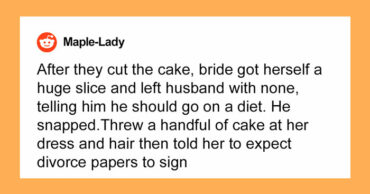Awkward conversations are an essential part of online dating. But the exchange that writer Natalia Antonova had with one of her Bumble admirers proved to be way more uncomfortable than the average small talk.
The guy got very bitter that he didn’t match with Natalia on the app. So he did what every madman would do: he tracked her down on Instagram and slid into her DMs to complain about it.
Luckily, Natalia handled it like a pro and put him in his place.

Image credits: Kev Costello (not the actual photo)

Image credits: NataliaAntonova
Sharing the conversation, Natalia called it “a great moment in incel history.” The term, a portmanteau of “involuntary celibate”, describes a member of an online subculture of people who define themselves as unable to find a romantic or sexual partner despite desiring one.
Incel online discussions are often characterized by resentment and hatred, misogyny, misanthropy, self-pity and self-loathing, racism, a sense of entitlement to sex, and the endorsement of violence against sexually active people.
You could say their culture is a result of toxic masculinity. Aaron Gouveia, the author of Raising Boys to Be Good Men, thinks toxic masculinity is so prominent in our society because it is the default. “It’s societal and systemic—the stew in which men automatically marinate and the air we breathe,” he told Bored Panda.
“Boys are bombarded with toxic masculinity and hyper-masculine messages right from the outset, starting with the ‘Lock up your daughters’ onesies we put on children to how men are taught to stifle basic human emotions like sadness, empathy, and compassion. It’s saying ‘no homo’ when we hug a male friend or being told we’re ‘gay’ any time we actually get vulnerable with someone. It’s pervasive to the point of being inescapable and it’s the invisible hands around our necks before we even know we’re being strangled. Only by recognizing it, sitting with the uncomfortable truth that we’re affected by it, and making a concerted effort to combat it can we start implementing change,” Gouveia, whose upcoming book Men and Miscarriage is coming out July 6, explained.
The conversation got really weird really fast

But Natalia didn’t lose her cool




And handled the situation perfectly

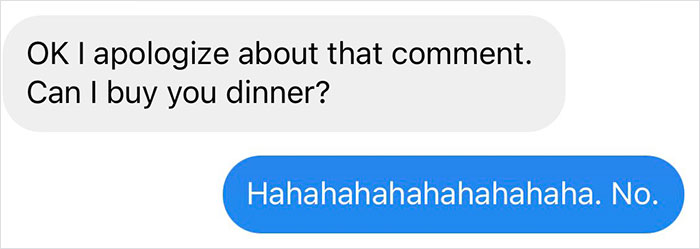
It might seem that only women have to deal with this crap. But toxic masculinity produces much more than awkward conversations on dating apps. Guys suffer from it too. “All boys and men experience toxic masculinity,” Gouveia said.
“My three boys play youth sports and we always have at least a few parents who are of the ‘stop throwing like a girl’ variety, as if anything womanly is an insult. When I was working as a journalist years ago and my wife was in banking, she made more than double my salary. I’d accompany her to lavish corporate retreats and all the other men there would make ‘sugar mama’ comments to me and wonder how I could stand my wife making more money. When I took paternity leave with my youngest two sons, some people were surprised and asked me how my ‘vacation’ was upon my return. As if taking care of a newborn is relaxing. Again, toxic masculinity is everywhere all the time and experienced by all.”
Gouveia thinks that so far we have not contained toxic masculinity. At all. “The emergence of the term is a positive because it’s being recognized, but the backlash has been severe and predictable as well,” he explained. “You can’t see what you won’t bother looking for and, unfortunately, a lot of men fall into this category when it comes to toxic masculinity.”
“I was one of them for a while. My book, Raising Boys to Be Good Men, is written from that vantage point. It’s about all the things I did wrong and all the ways I contributed to toxic masculinity without even knowing what that term was. I know full well some people can’t be reached but I also believe some men, like me, might change their ways when they realize they’ve been contributing to a problem they didn’t even know existed. When we know better we can do better, and that’s why parents are the most important demographic to reach. It’s much easier to build boys up to be good men than to change the mindsets of adults who have absorbed a lifetime of toxicity.”
In 2019, for the first time ever, American Psychological Association (APA) released guidelines to help psychologists work with men and boys. At first glance, this may seem unnecessary. After all, as of 2018, 95.2 percent of chief operating officers at Fortune 500 companies were men. In 16 of the top companies, 80 percent of all high-ranking executives were male. And the 115th Congress, which began in 2017, was 81 percent male.
But consider this: men commit 90 percent of homicides in the US and represent 77 percent of homicide victims. They’re the demographic group most at risk of being victimized by violent crime. They are also 3.5 times more likely than women to die by suicide, and their life expectancy is 4.9 years shorter than women’s. Plus, boys are far more likely to be diagnosed with attention-deficit hyperactivity disorder than girls, and they face harsher punishments in school—especially boys of color.
“It’s very important to note that denouncing toxic masculinity doesn’t mean all masculinity is bad,” Gouveia added. “We’re talking about toxic extremes. For instance, strength is a positive but raising a kid to be tough at all times and never show weakness, emotion, or vulnerability is toxic. Wanting to protect your family is obviously a good thing, but not when fathers of daughters gatekeep their daughters’ virginity and think threatening every boy who comes along is acceptable.”
Saying you’re against toxic masculinity is not hating all men or being weak, the author highlighted, it’s recognizing that some extreme aspects of masculinity severely limit boys and men and negatively impact society in general.
Here’s what people said about the exchange
Image credits: NataliaAntonova

Image credits: petenator39

Image credits: _asherdoodle

Image credits: aliciakatz

Image credits: defnottori_

Image credits: baynegibby

Image credits: chick_in_kiev

Image credits: NataliaAntonova

Image credits: MsShelleyRoman
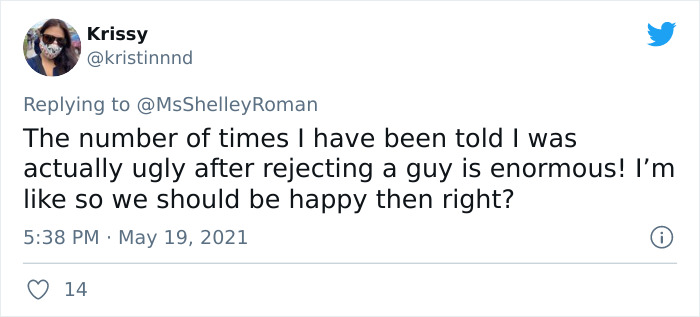
Image credits: kristinnnd

Image credits: AJ_F612

Image credits: TaylorrObvi

Image credits: MistressMercer

Image credits: TheAliciaKraft
One Twitter user also introduced the nice guy she ran into on Bumble

Image credits: sonshine1411





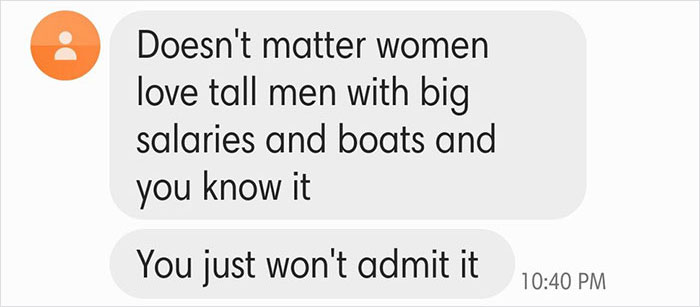
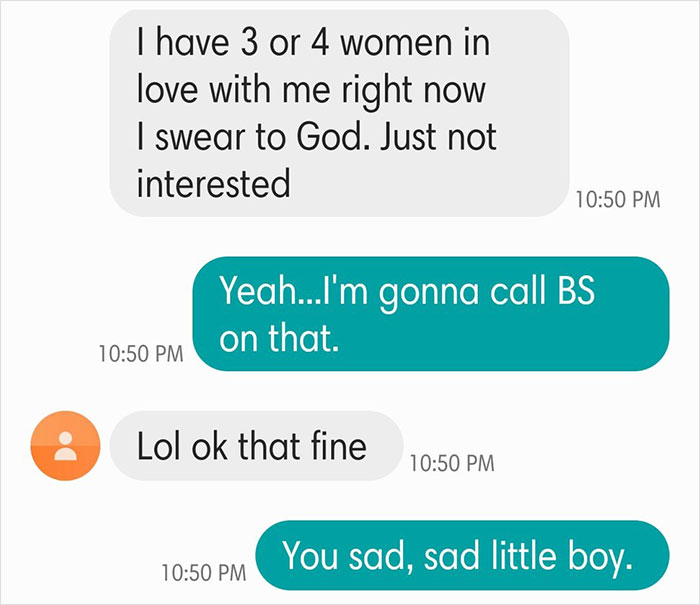
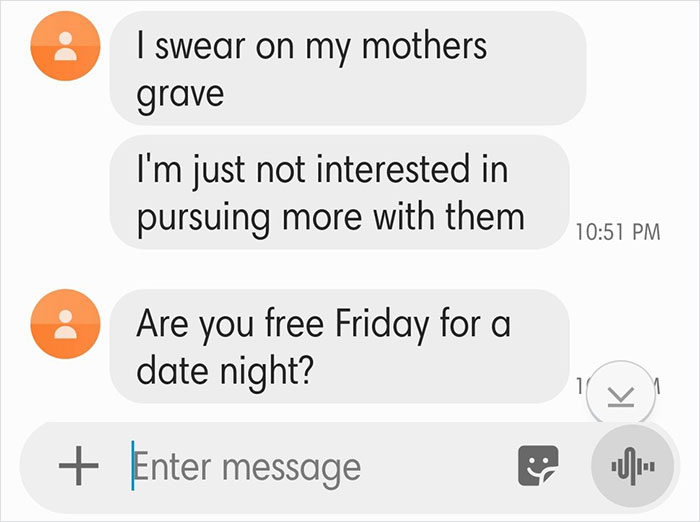
Image credits: sonshine1411
 Follow Us
Follow Us
